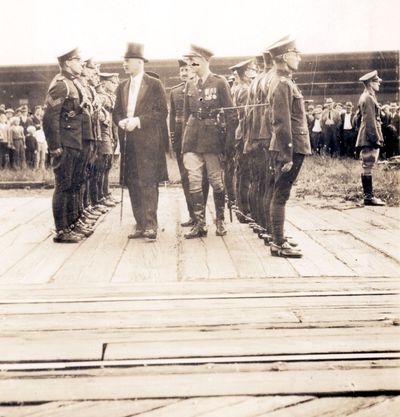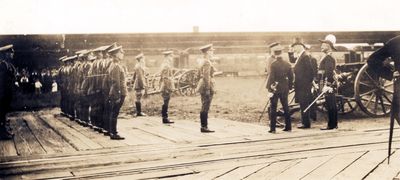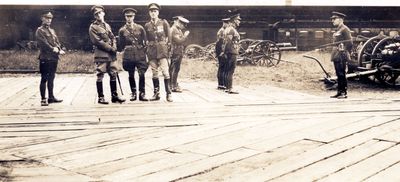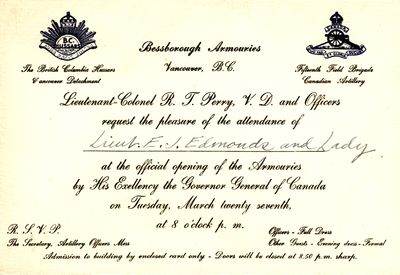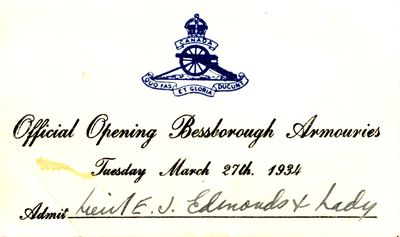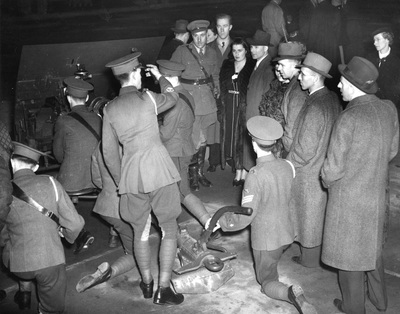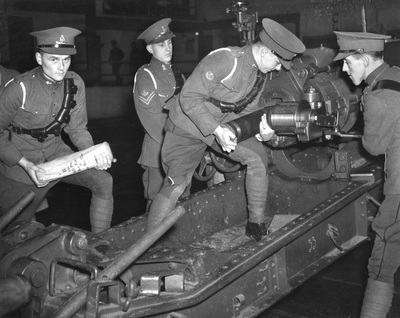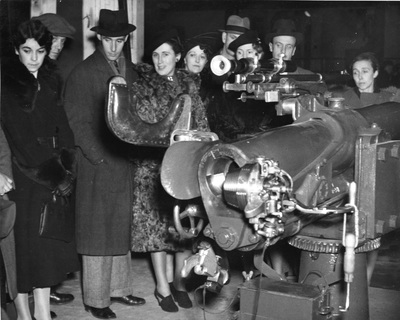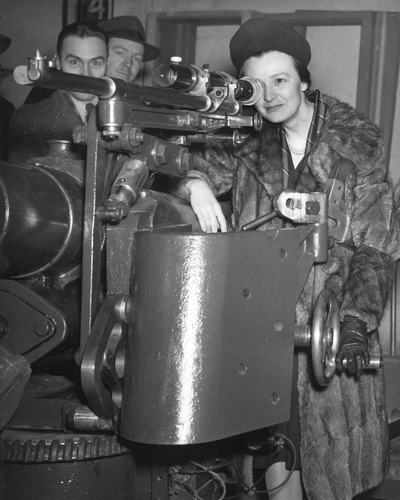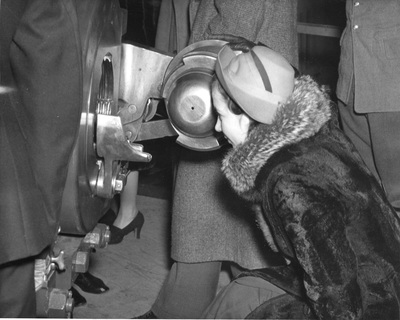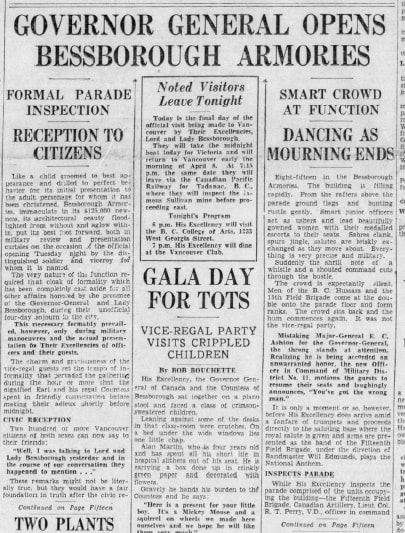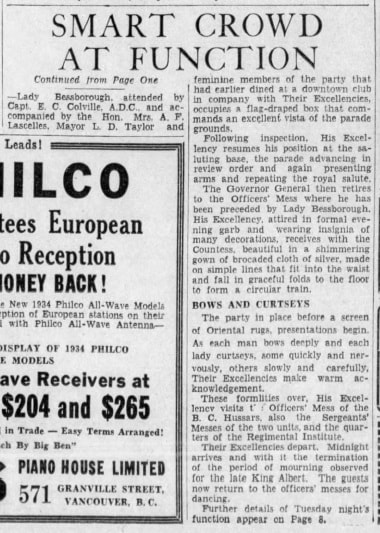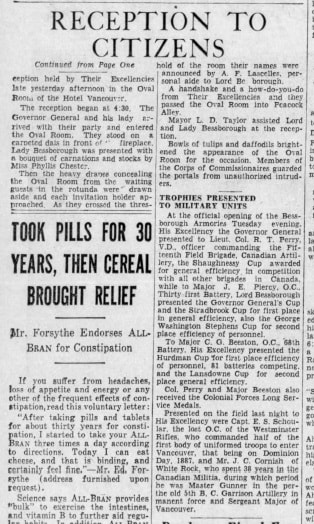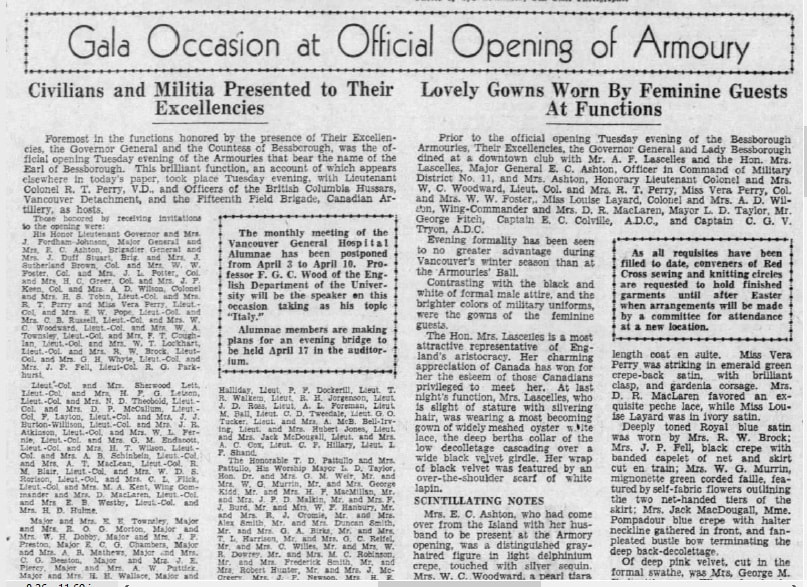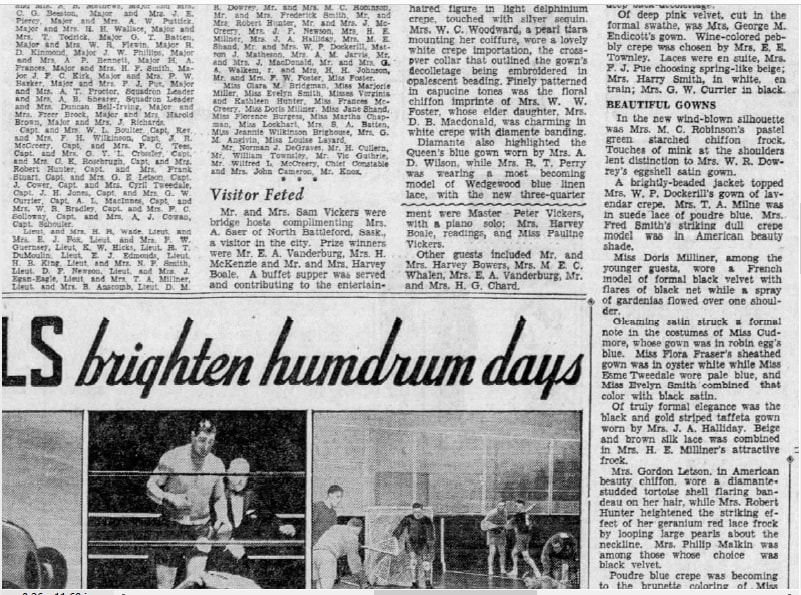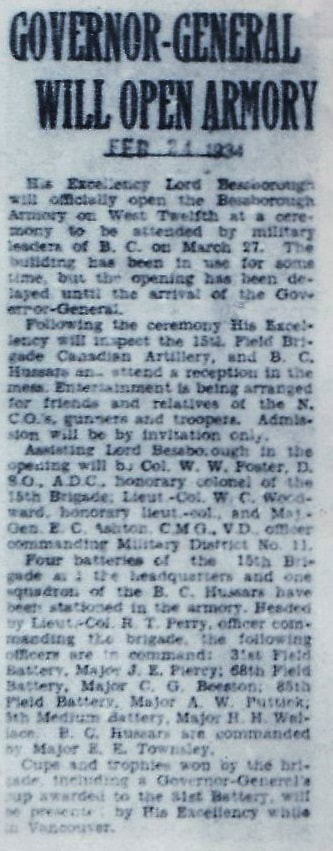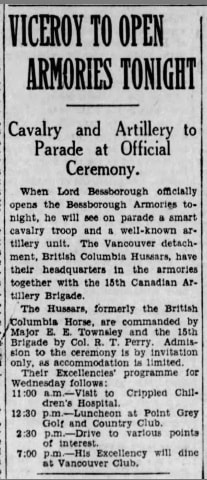The following pictures are from Vancouver Archives where they may have been incorrectly identified as Armoury Opening 1944 rather than the actual 1934 date. They show the members of the Brigade providing demonstrations for a very well attired audience.
Bessborough Armoury Official Opening
The Earl of Bessborough officially opened the Armoury on March 27th, 1934. He was greeted at the Canadian National Railway Station by the Saluting Battery and military dignitaries including Lieutenant Colonel Richard Thomas Perry, the architect of Bessborough Armoury and the current Commanding Officer of the 15th Brigade, Canadian Field Artillery. Brigadier Sutherland-Brown, Deputy Officer Commanding Military District MD XI was also in attendance as well as the following Brigade members: Battery Sergeant Major Stevenson, Lieutenant Hicks, Lieutenant Edmonds, Major Beeston and Captain Percy Curran Tees, MM.
The Governor-General attended other events in the city before opening the Armoury on the evening of 27th March with a formal reception.
The Governor-General attended other events in the city before opening the Armoury on the evening of 27th March with a formal reception.
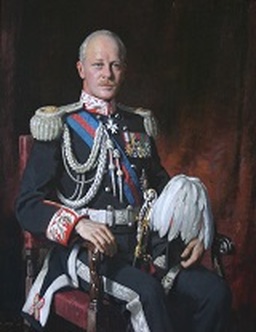
Vere Brabazon Ponsonby, 9th Earl of Bessborough, GCMG PC (27 October 1880 – 10 March 1956) was a British businessman and politician who served as Governor General of Canada, the 14th since Canadian Confederation. Born and educated in England, he graduated with a law degree from Cambridge University before entering politics as a member of the London County Council and then, in 1910, as a member of the British House of Commons.
By the following year, however, the First World War broke out and, whilst retaining his parliamentary seat, Ponsonby joined the army and was commissioned as a second lieutenant in Royal Buckinghamshire Yeomanry. He was transferred on 11 November 1914 to the Suffolk Hussars (both units were part of the Territorial Force and were sent into action overseas), where he was later appointed captain and promoted to acting major. He served at Gallipoli in 1915 and, from 1916 to 1918, on the military staff in France. During his wartime service, he was mentioned in dispatches, awarded the Croix de chevalier of the French Legion of Honor, and appointed to the Italian Order of St Maurice and St Lazarus, the Belgian Order of Leopold II, Greece's Order of the Redeemer, as well as a Third Class Member of the Russian Order of St Anna. At the conclusion of the war, Ponsonby was appointed a Companion of the Order of St. Michael and St. George in the 1919 New Year Honours List.
By the following year, however, the First World War broke out and, whilst retaining his parliamentary seat, Ponsonby joined the army and was commissioned as a second lieutenant in Royal Buckinghamshire Yeomanry. He was transferred on 11 November 1914 to the Suffolk Hussars (both units were part of the Territorial Force and were sent into action overseas), where he was later appointed captain and promoted to acting major. He served at Gallipoli in 1915 and, from 1916 to 1918, on the military staff in France. During his wartime service, he was mentioned in dispatches, awarded the Croix de chevalier of the French Legion of Honor, and appointed to the Italian Order of St Maurice and St Lazarus, the Belgian Order of Leopold II, Greece's Order of the Redeemer, as well as a Third Class Member of the Russian Order of St Anna. At the conclusion of the war, Ponsonby was appointed a Companion of the Order of St. Michael and St. George in the 1919 New Year Honours List.
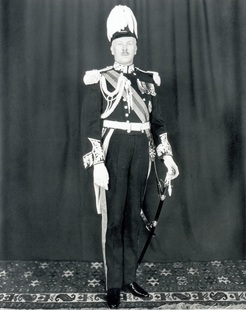
After the death of his father on 1 December 1920, he succeeded to the Irish earldom of Bessborough, requiring him to resign his seat in the House of Commons and enter the House of Lords. On 17 December, he applied to be Crown Steward and Bailiff of the Three Hundreds of Chiltern. The earl also pursued a successful business career, holding directorships in several large commercial firms, including acting as head of both the São Paulo Railway and the Margarine Union, as well as deputy chairman of De Beers Consolidated Mines. It was announced in early 1931 that King George V had, by commission under the royal sign-manual and signet, appointed Ponsonby as his representative. This had been done on the recommendation of British Prime Minister Ramsay MacDonald, with input from Prime Minister of Canada Richard Bennett, and came as somewhat of a surprise, as Ponsonby was the only businessman to have ever been appointed governor general.
After being admitted into the Privy Council of the United Kingdom on 20 March 1931, Ponsonby travelled to Canada and was sworn in as governor general on 4 April, in the midst of the Great Depression. In his ensuing travels as viceroy, Ponsonby witnessed the struggles of Canadians during this period, and praised their tenacity; in Shawbridge, Quebec, he stated in a speech: "There is nothing more encouraging and cheering than the calm steady way Canadians have pursued their daily tasks during the difficult period with a supreme faith in the destiny of their country." As a sign of his sympathy with the majority of the populace, he gave up 10% of his salary.
Despite the economic situation, Canada was gaining international stature and Ponsonby acted as host to the leaders who, in July 1932, converged on Ottawa for the Imperial Economic Conference. He also presided over the opening of the Welland Canal the same year. The Governor General welcomed a number of foreign dignitaries, including Prince Takamatsu and his wife, Princess Takamatsu; King Rama VII of Siam and his consort, Queen Ramphaiphanni; and Winston Churchill, then a British Member of Parliament. There were also a number of technological firsts that took place during Ponsonby's tenure: his installation ceremony was the first to be broadcast by radio; in 1932, from the governor general's study at Rideau Hall, he inaugurated the first trans-Canada telephone line by calling each of the lieutenant governors; and, as Governor-in-Council, he created the Canadian Broadcasting Corporation. Ponsonby was also the first Canadian viceroy to fly the new standard dedicated to that office, created in 1931.
Ponsonby's time as governor general coincided with the celebrations in May 1935 for the Silver Jubilee of the King's reign, part of which included his launching the King's Jubilee Cancer Fund with a radio broadcast from Rideau Hall, and also initiated a campaign to increase the membership of the Scouts. But the most prominent mark that Ponsonby left on Canada was the Dominion Drama Festival, which was developed with the assistance of future governor general Vincent Massey and Henry C. Osborne and first held in April 1933, and awarded the Bessborough Trophy to the best amateur theatrical company in the country.
https://en.wikipedia.org/wiki/Vere_Ponsonby,_9th_Earl_of_Bessborough
After being admitted into the Privy Council of the United Kingdom on 20 March 1931, Ponsonby travelled to Canada and was sworn in as governor general on 4 April, in the midst of the Great Depression. In his ensuing travels as viceroy, Ponsonby witnessed the struggles of Canadians during this period, and praised their tenacity; in Shawbridge, Quebec, he stated in a speech: "There is nothing more encouraging and cheering than the calm steady way Canadians have pursued their daily tasks during the difficult period with a supreme faith in the destiny of their country." As a sign of his sympathy with the majority of the populace, he gave up 10% of his salary.
Despite the economic situation, Canada was gaining international stature and Ponsonby acted as host to the leaders who, in July 1932, converged on Ottawa for the Imperial Economic Conference. He also presided over the opening of the Welland Canal the same year. The Governor General welcomed a number of foreign dignitaries, including Prince Takamatsu and his wife, Princess Takamatsu; King Rama VII of Siam and his consort, Queen Ramphaiphanni; and Winston Churchill, then a British Member of Parliament. There were also a number of technological firsts that took place during Ponsonby's tenure: his installation ceremony was the first to be broadcast by radio; in 1932, from the governor general's study at Rideau Hall, he inaugurated the first trans-Canada telephone line by calling each of the lieutenant governors; and, as Governor-in-Council, he created the Canadian Broadcasting Corporation. Ponsonby was also the first Canadian viceroy to fly the new standard dedicated to that office, created in 1931.
Ponsonby's time as governor general coincided with the celebrations in May 1935 for the Silver Jubilee of the King's reign, part of which included his launching the King's Jubilee Cancer Fund with a radio broadcast from Rideau Hall, and also initiated a campaign to increase the membership of the Scouts. But the most prominent mark that Ponsonby left on Canada was the Dominion Drama Festival, which was developed with the assistance of future governor general Vincent Massey and Henry C. Osborne and first held in April 1933, and awarded the Bessborough Trophy to the best amateur theatrical company in the country.
https://en.wikipedia.org/wiki/Vere_Ponsonby,_9th_Earl_of_Bessborough
In the News
The opening of the Bessborough Armoury was certainly the big news item for the Brigade this year.
The opening of the Bessborough Armoury was certainly the big news item for the Brigade this year.
